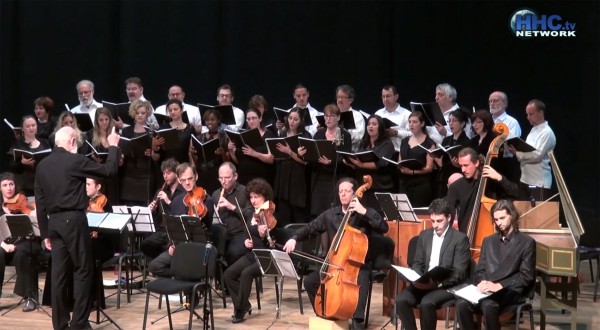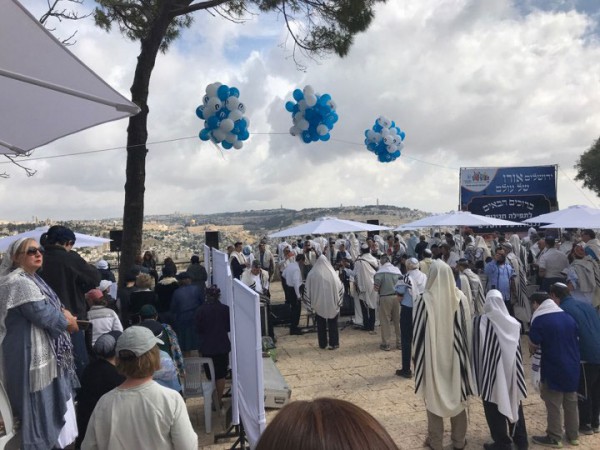“Sing aloud with gladness for Jacob, and raise shouts for the chief of the nations; proclaim, give praise …” (Jeremiah 31:7)
It seems that Jewish People and Christians just can’t get enough of one Hebrew word that evokes hope and joy, thanksgiving and praise — Halleluyah!
Let’s find out what it really means and how it has been used over the millennia.
At the Western (Wailing) Wall, an Orthodox Jewish man raises his hands in worship to God. If you look closely, you will see that written prayers from thousands of worshipers are stuffed into the spaces between the stones.
In Hebrew Halleluyah is spelled, הַלְלוּיָה
In English, you may have seen it written “alleluia” or “halleluyah.” The more precise way to spell it is Halleluyah, which is actually two Hebrew words written as one: Hallel (Praise) and Yah, which is a shortened form of YHVH, the personal name of the Lord God of Israel.
The hallel-u (הַלְלוּ) is a command to you plural — that is, “You all, praise.”
Whom do we praise?
Praise Yah! (יָהּ).
Where do we praise Yah?
“Praise God in his sanctuary; praise Him in His mighty heavens,” it says in Psalm 150 verse 1.
Why do we praise Yah?
“For His mighty deeds; praise Him according to His excellent greatness.” (Psalm 150:2)
In other words, we praise Him everywhere for everything He is and does.
How do we praise Yah?
Psalm 150 tells us we are to praise Him with dancing as well as with the sound of the trumpet, harp, lyre, tambourine, strings, pipe, clashing of cymbals and with our voices:
“Let everything that has breath Hallel-u Yah, Hallel-u Yah — Praise the Lord, Praise the Lord.” (verse 6)
Twenty-four times the Psalms tell us to Praise Yah.
The Psalms were written for the Levites to sing; and today, the Jewish people still partake in singing the Tehillim, the Hebrew name referred to as Psalms, but which literally means Praises.
Sing Hallelu-Yah!
“Praise the LORD. How good it is to sing praises to our God, how pleasant and fitting to praise Him!” (Psalm 147:1)
The Halleluyah chorus of Handel’s Messiah is perhaps the most well-known lyrics praising Yah. It is sung with triumphant, loud Halleluyahs. And there is great reason for doing so.
From the Psalms through the Prophet Isaiah to the Gospels and on to Revelation, 52 Messianic prophecies straight out of the Bible are lyrically arranged, telling of the coming, dying, and reigning of Messiah.
Handel’s Messiah is performed below by the Royal Choral Society of London. It first debuted in Dublin, Ireland in 1742 and was composed a year earlier by German-born George Frideric Handel. Its Messianic lyrics were arranged by Handel’s English preacher-friend, Charles Jennens.
The lyrics include Messianic prophecies such as these:
- And the glory of the Lord shall be revealed, and all flesh shall see it together: for the mouth of the Lord hath spoken it. (Isaiah 40:5)
- For unto you is born this day in the city of David a Saviour, which is Messiah the Lord. (Luke 2:10–11)
- Wonderful Counsellor! Mighty God! Everlasting Father! Prince of Peace! (Isaiah 9:6)
- He was cut off out of the land of the living; for the transgression of Thy people was He stricken. (Isaiah 53:8)
- But thanks be to God, who giveth us the victory through our Lord Yeshua HaMashiach. (1 Corinthians 15:57)
- Let all the angels of God worship Him. (Hebrews 1:6)
- And He shall reign for ever and ever — King of kings, Lord of lords. Halleluyah! Halleluyah! Halleluyah! (Revelation 19:6, 11:15, 19:16)
Handel composed his HalleluYah symphony for the purpose of “SDG,” which he wrote at the end of his manuscript (see image above), signifying “Soli Deo Gloria” or “To God alone the glory.”
Throughout Israel, Handel’s Messiah has been gloriously performed along with the Messianic prophecies triumphantly sung in Hebrew!
From the Garden Tomb in Jerusalem (where Messiah Yeshua is thought to have been buried and resurrected) to Beersheba in southern Israel (where Abraham dug a well on his journey through Canaan, Genesis 21:30-32), God’s Chosen People have heard about their Messiah in their own native language with Messianic promises the patriarchs and prophets longed to know.

Several hundred Holocaust survivors hear Handel’s Messiah sung in Hebrew in Caesarea, Israel. The performance was hosted by the Helping Hand Coalition and conducted by David Loden, Musical Director of the Kamti organization. (Helping Hand Coalition YouTube capture)
Pray Hallelu-Yah!
Another way we can praise Yah is by reading and singing the Psalms as a form of prayer.
Hallel (Praise) is the name given to a group of psalms of praise, Psalms 113–118. The first line of the Hallel is, of course, “Hallelu-Yah!” (Psalm 113:1)
From the exodus out of Egypt through the giving of the Torah on Mount Sinai to the future reigning of Messiah in the Messianic Age, the Hallel expresses the joy of the Jewish People for past and future fulfillment of promises by the God of Israel Himself, YHVH.
The Hallel (Praise) is sung in synagogues throughout the world on Shavuot (Pentecost) as well as on the other two pilgrimage feasts of Pesach (Passover) and Sukkot (Tabernacles).
The Hallel are also recited on the first day of Hanukkah, commemorating the rededication of the Temple, where the Levites sung. Even Yeshua (Jesus) may have been present during the Hallel at Hanukkah (see John 10:22–30).
The Hallel ends as it begins, with praise:
“You are my God, and I will praise you; you are my God, and I will exalt you. Give thanks to YHVH, for He is good; His love endures forever.” (Psalm 118:28–29)

Rabbis, singers, and dancers (Jewish and Gentile) gather on the Jerusalem promenade overlooking the Temple Mount and the Mount of Olives to sing the Hallel psalms, acknowledging the God of Israel and all that He has done in restoring His Land and People.
Shout Hallelu-Yah!
Four Halleluyahs highlight the Book of Revelation, chapter 19 verses 1, 3, 4, 6.
“Halleluyah! Salvation and glory and power belong to our God.” (verse 1)
“And again they shouted: ‘Halleluyah!’” (verse 3)
“The twenty-four elders and the four living creatures fell down and worshiped God, who was seated on the throne. And they cried: ‘Amen, Halleluyah!’” (verse 4)
It is also the keynote of the great multitude in Heaven, who shout out “like the sound of many waters and like the sound of mighty thunder”:
“Halleluyah! For the Lord our God the Almighty reigns.” (verse 6)
Why are the multitudes shouting these praises?
Because God has avenged all those who were slain during the Great Tribulation by condemning “the prostitute of Babylon who corrupted the earth by her adulteries.” Not only that, but “the smoke from her goes up forever and ever.” (verse 2)
The final defeat of pure evil is an excellent reason to shout praises to Yah!
It reminds us as Believers that our God is victorious. Despite our circumstances, He is still on the Throne. He alone has the last word over us, not our earthly superiors or those who may not have our best interests at heart.
May we be ready to meet our King on that glorious day of triumph.
“Let us rejoice and exult and give Him the glory. For the wedding of the Lamb has come, and His bride has made herself ready.” (verse 7)
Psalms 113–118 are sung and read at the three great pilgrim feasts of Pesach (Passover), Shavuot (Pentecost), and Sukkot (Tabernacles). A high-note of the three main feasts includes the verse, “I shall not die, but live, and declare the works of the Lord.” (Psalm 118:17)
Hallelu-Yah Anyway and Always
Often as Believers, we find it easy to say Hallelu-Yah! when we receive an answer to prayer or when things are going well. However, praising God is not always conditional on God’s blessing.
He does bless, for which we praise Him, but Job reminds us that “the LORD (YHVH) gave, and the LORD has taken away; blessed be the name of the LORD.” (Job 1:21)
It comes as quite a revelation when we hear someone for whom life or circumstances are difficult, still declare, “Praise the LORD — Hallelu-Yah!”
God is larger than our situation. Even when our souls are cast down, we can still look up and remember that the heavens “declare the glory of God; the skies proclaim the work of His hands.” (Psalm 19:1)
And sometimes, our praises preceed the great work that God is about to do.
For example, after Paul cast a demon out of a young girl, he and Silas were stripped, flogged, and shackled in prison, but that didn’t stop them from praising God.
“About midnight Paul and Silas were praying and singing hymns to God, and the other prisoners were listening to them. Suddenly there was such a violent earthquake that the foundations of the prison were shaken. At once all the prison doors flew open, and everyone’s chains came loose.” (Acts 16:27-28)
God is our King who forever sits on His throne: “Sing praises to God, sing praises; sing praises to our King, sing praises.” (Psalm 47:5–6)
And when we think that we have no reason to praise our Creator and King, we can go to Psalm 98 and praise Him for His “love and his faithfulness to Israel; all the ends of the earth have seen the salvation of our God.” (verse 3)
God has delivered each of us out of eternal condemnation that our sin requires, through the blood of Messiah Yeshua.
May we never forget the price He paid to set us free so we may have a reason to worship and praise our King of kings and Lord of lords, always. Halleluyah!









